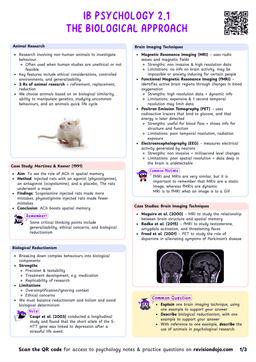Mental Health Disorders
Mental Health Disorders
A pattern of behavior or thinking that causes distress or impairment in functioning, deviating from cultural norms.
Key Features of Mental Health Disorders
- Distress: The disorder causes significant emotional pain or discomfort.
- Impairment: It interferes with daily functioning, such as work, relationships, or self-care.
- Deviance: The behavior or thoughts are unusual or abnormal compared to societal norms.
A Look into Anxiety
- This section will focus on anxiety, a disorder characterised by an excess of worrying about future events.
- It may not have a tangible reason.
- It includes disorders like Generalized Anxiety Disorder (GAD), Social Anxiety Disorder (SAD), and Obsessive-Compulsive Disorder (OCD).
Explanations for Mental Health Disorders
Biological Explanations
- Genetic Variations: Anxiety disorders have been linked to a variation of the 5-HTTLPR gene, which is involved in serotonin transport.
- Hormonal Imbalances: Elevated cortisol has been linked to anxiety disorders.
- Pre-existing Health Conditions: Chronic illness, for example, may lead to developing anxiety.
- Stress: Prolonged stressful conditions may lead to anxiety.
- Just because there may be a biological link between biology and anxiety, it does not mean it is the only factor.
- It is important to look at cognitive and social factors too.
Chavanne & Robinson (2021)
Aim: Is there a possible biological explanation for anxiety?
Method: A meta-analysis of 181 articles looking into posttraumatic stress disorder, social anxiety disorder, generalized anxiety disorder, panic disorder, and specific phobia.
Results: There was a link between both induced and pathological anxiety with increased activation in the left and right insula as well as the cingulate cortex/medial prefrontal cortex.
Therefore, there may be a causal link between neurobiology and anxiety.
Critical Thinking
- What about anxiety disorders that are triggered by an event?
- How does the biological explanation affect treatment?
Cognitive Explanations
- The Cognitive Behavioural Model of GAD is one of the many models used to explain the onset of anxiety. It includes:
- Intolerance of Uncertainty: Uncertain situations typically lead to a negative response.
- Positive Beliefs of Worry: The belief that worrying, even if irrational, will present disaster.
- Negative Problem Orientation: The belief that one cannot solve their problems competently.
- Cognitive Avoidance: Avoiding anxious feelings behaviourally.
Critical Thinking
- Is the cognitive model of GAD a cause or a symptom?
- How may it affect therapies such as cognitive-behavioural therapy?
Cultural Explanations
- Enculturation may lead to people harboring different ideas of mental health, which may affect how they present.
- Acculturative stress may add to anxiety, as well as cultures where mental health is a taboo.
Anxiety in the USA
- It is treated through a combination of therapy and medication, typically cognitive-behavioural therapy.
- Behavioural strategies are advised.
Anxiety in Japan
- Incorporation of traditional practices.
- Morita therapy is a culturally specific treatment that has its roots in Buddhism. It focuses on accepting that anxiety is part of life.
- The behavioural strategies are often more culturally specific.
Marques et al. (2011)
- Meta-analysis on prevalence of anxiety disorders worldwide.
- Panic disorder was more prevalent in the USA.
- The lowest rates of anxiety were found in Africa and Asia.
Critical Thinking
- What about the genetic basis of some mental health disorders?
- How may the challenges of acculturation affect anxiety?
Environmental Factors
- This section will focus on the importance of life events in the development of anxiety.
- This could be early life experiences, parenting styles, socioeconomic influences, etc.
- This could also be sudden events such as loss of a loved one, losing one's job, or divorce. This could also be due to prolonged stress, as discussed earlier.
- The access to mental health care may also influence the course of the disorder.
Gosselin & Laberge (2003)
- The researchers conducted a review of existing literature to look at existing etiologies for GAD.
- Significant, unexpected life events have been linked to anxiety.
- They also found links to cognitive factors such as intolerance of uncertainty, positive beliefs about worry, and cognitive avoidance.
- Familial issues such as conflict and abuse were correlated with anxiety.
Overall, Gosselin & Laberge concluded that GAD may be due to a combination of a psychological vulnerability and an existing tension.
- How could a combination of biological and environmental factors lead to anxiety (epigenetics)?
- What is a strength and limitation of meta analyses as a research method?
- What is a strength and limitation of each approach to the etiology of anxiety?


